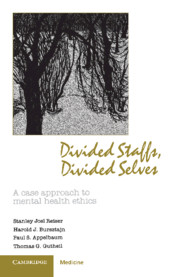Book contents
- Frontmatter
- Contents
- Acknowledgments
- About the authors
- 1 Introduction
- 2 New problems, new ethics: challenging the value structure of health care
- 3 Conflict and synthesis: the comparative anatomy of ethical and clinical decision making
- 4 Solving clinical puzzles: strategies for organizing mental health ethics rounds
- CASES IN MENTAL HEALTH ETHICS
- I Informed consent, competency, and involuntary treatment
- II Confidentiality
- III Truth-telling
- IV Managing difficult patients
- V Parents and children
- VI Religion and mental health treatment
- VII Allocation of resources
- VIII Research
- IX Mental health and medical illness
- X Mental health and criminal justice
- Bibliography
- Index
II - Confidentiality
from CASES IN MENTAL HEALTH ETHICS
Published online by Cambridge University Press: 06 July 2010
- Frontmatter
- Contents
- Acknowledgments
- About the authors
- 1 Introduction
- 2 New problems, new ethics: challenging the value structure of health care
- 3 Conflict and synthesis: the comparative anatomy of ethical and clinical decision making
- 4 Solving clinical puzzles: strategies for organizing mental health ethics rounds
- CASES IN MENTAL HEALTH ETHICS
- I Informed consent, competency, and involuntary treatment
- II Confidentiality
- III Truth-telling
- IV Managing difficult patients
- V Parents and children
- VI Religion and mental health treatment
- VII Allocation of resources
- VIII Research
- IX Mental health and medical illness
- X Mental health and criminal justice
- Bibliography
- Index
Summary
KEEPING SECRETS
Are therapists obligated to withhold from patients information they have about their family?
The patient is a young man in his 20s admitted to the hospital for increasingly disorganized and bizarre behavior. His halfway house is rapidly nearing the limits of its patience with him because of his disruptive lying and stealing; the patient may also be jeopardizing his part-time job by similar antisocial behavior. As the assessment proceeds, the treatment team is struck by the lack of information on this patient, especially concerning his parents and other members of the family. Although the parents live in the same city, they have allegedly cut all ties with the patient and want little to do with him. Similarly, he presents himself as having separated fully from them, and, by inference, the treatment team believes that this again has to do with their reaction to his inappropriate and unmanageable behavior.
After a period of time, a different, deeper perception emerges. It becomes clear that the patient misses his family a great deal, but attempts in a certain sense to “protect” the family from treatment team members by keeping them separated. He almost seems more concerned with their well-being than with himself. It becomes apparent that his recent decompensation is in part caused by the parents' alleged move to a nearby state and his sister's enrollment in a school on the West Coast.
- Type
- Chapter
- Information
- Divided Staffs, Divided SelvesA Case Approach to Mental Health Ethics, pp. 71 - 78Publisher: Cambridge University PressPrint publication year: 1987



